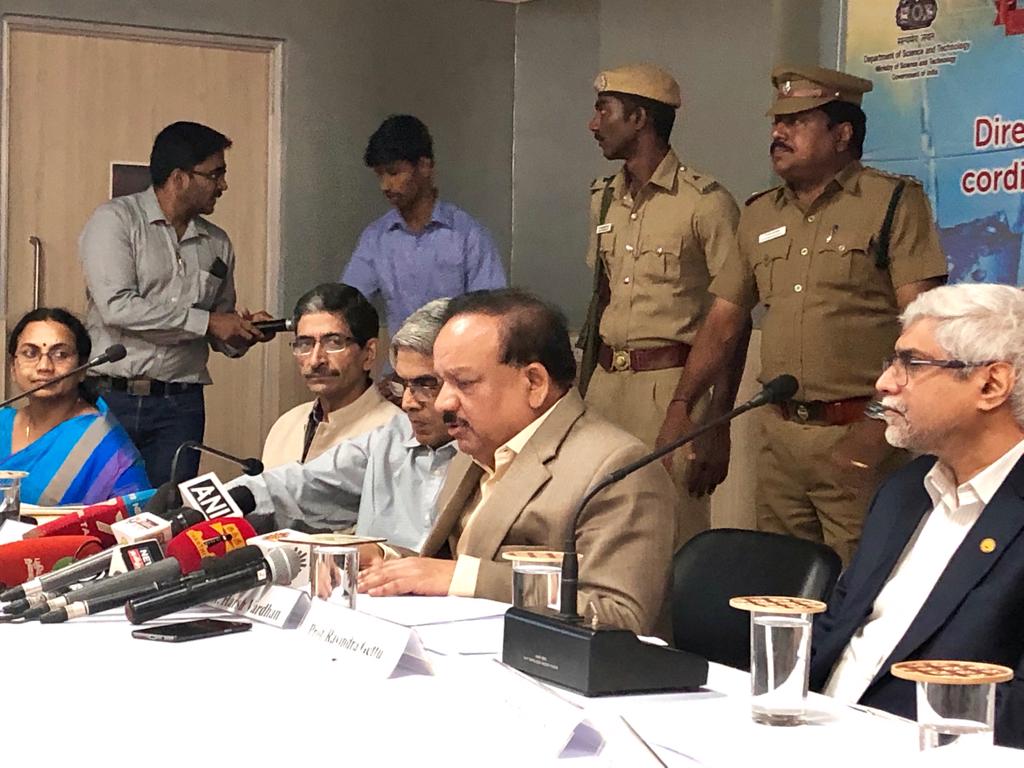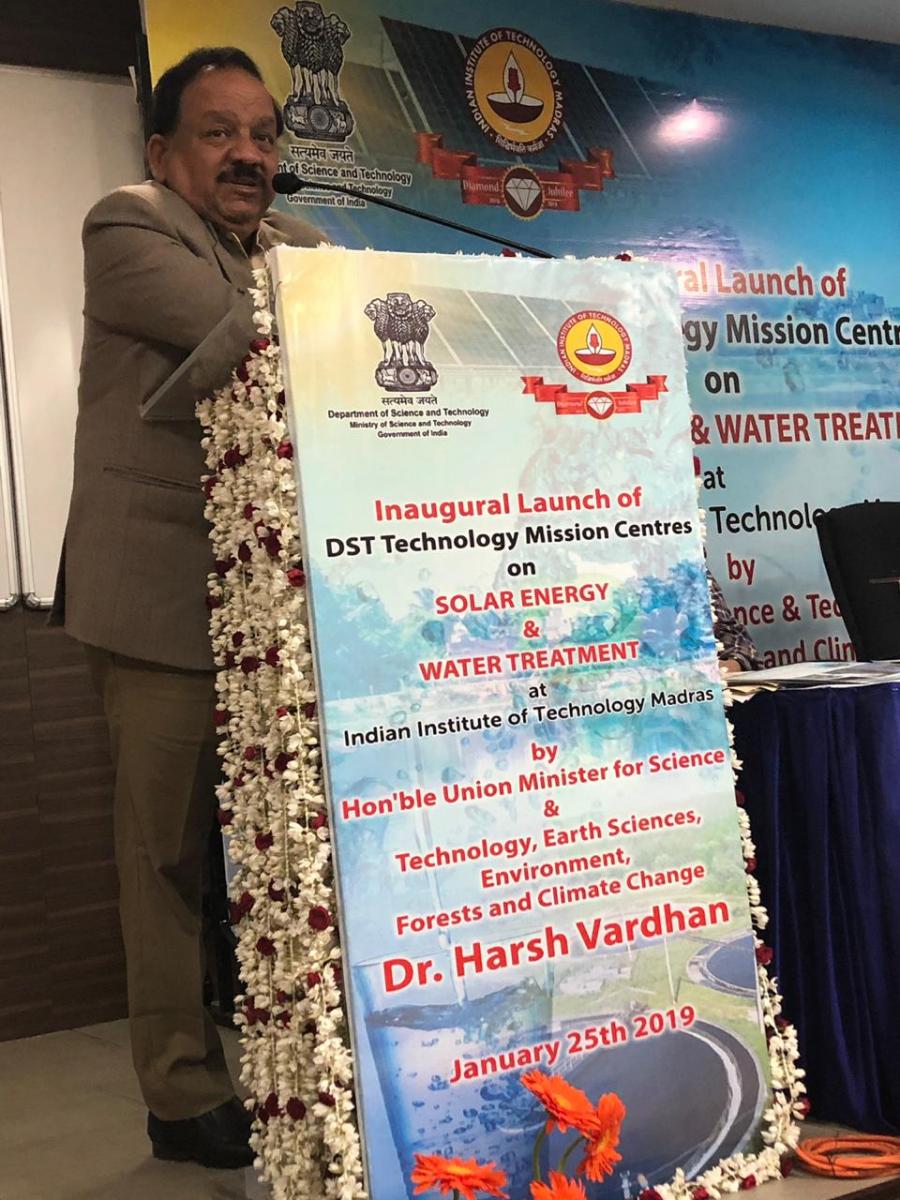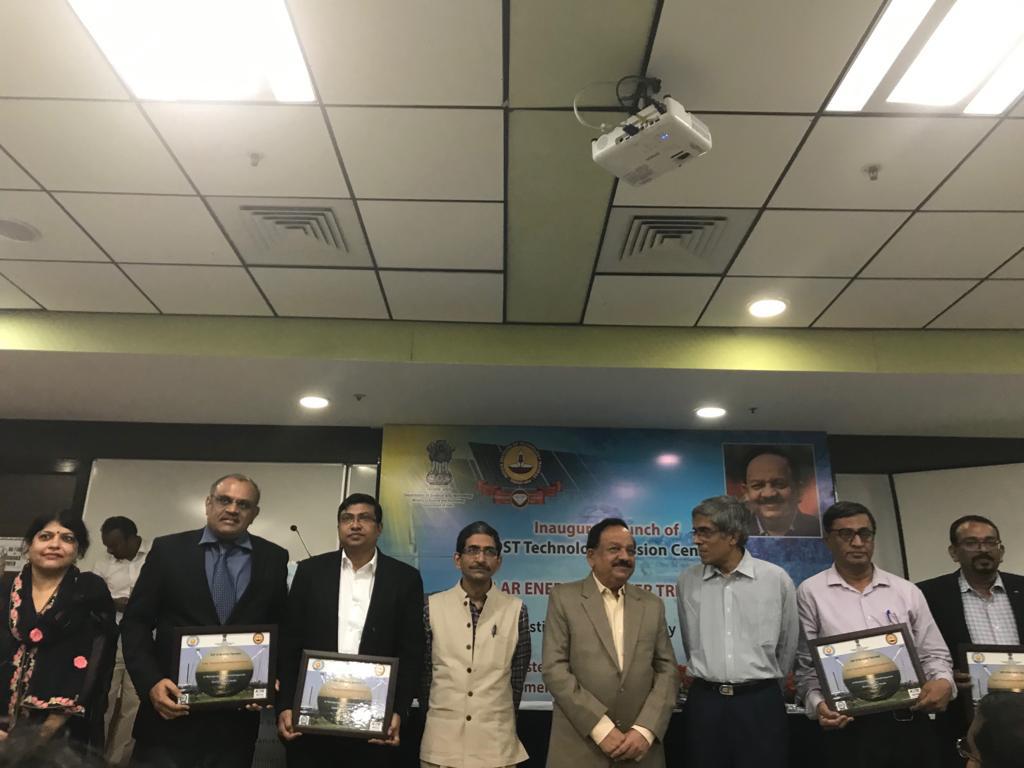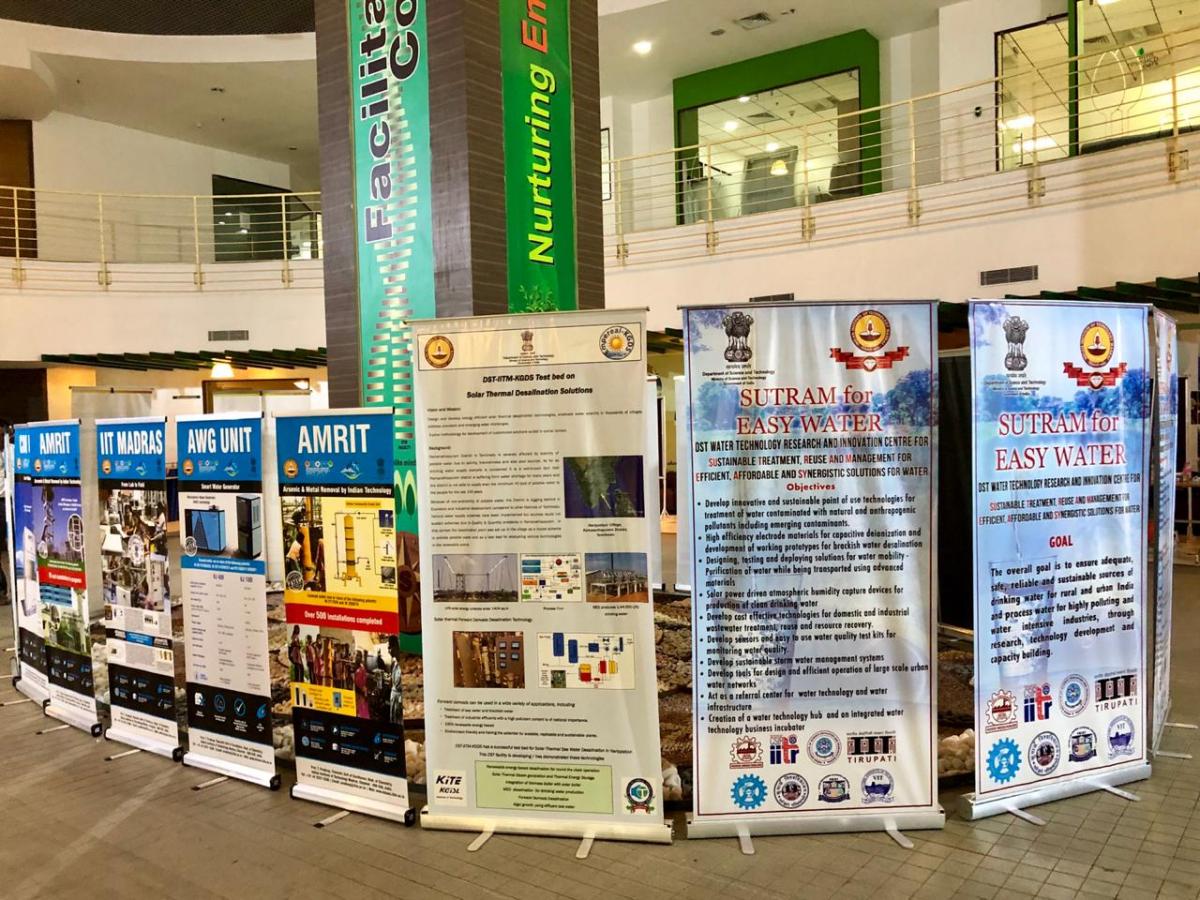 Chennai, 25th January, 2019: Union Minister for Science, Technology & Earth Sciences and Environment Forests & Climate Change and Earth Sciences Dr Harsh Vardhan launched three technology mission centres set up by Department of Science and Technology, Government of India nucleated at Indian Institute of Technology Madras in Chennai, Tamil Nadu.
Chennai, 25th January, 2019: Union Minister for Science, Technology & Earth Sciences and Environment Forests & Climate Change and Earth Sciences Dr Harsh Vardhan launched three technology mission centres set up by Department of Science and Technology, Government of India nucleated at Indian Institute of Technology Madras in Chennai, Tamil Nadu.
The centres included the DST–IITM Solar Energy Harnessing Centre, DST-IITM DST-IITM Water Innovation Centre and the Test bed on Solar thermal desalination solutions
These centres, which have been established at a collective investment of Rs 50 Crores, have the mission of providing state-of-art research led innovative technological solutions for prevalent and emerging water and energy challenges facing the country.
The Minister emphasised the commitment of the Government to harness science and technology for the societal challenges through roping in extra ordinary capabilities of scientists and scientific institution under the leadership of Hon’ble Prime Minister, Shri Narendra Modi. The national missions namely Namami Gange, Swachch Bharat, Solar Mission and Swastha Bharat are directed towards sustainable solutions. The Minister added that development and application of advanced tools and techniques by leading Indian institutions for water and energy is of utmost importance to address the critical scientific challenges involved. The current endeavours are few such steps in this direction. He enumerated the technology based energy and water solutions evolved in recent past and highlighted the significant investment made in national, bilateral and multi lateral research effort in last 4 years.
The Minister inaugurated the DST- IITM Solar Energy Harnessing Centre, which is first of its kind centre encompassing entire domain of Solar Energy research which includes highly efficient high throughput solar photovoltaics, solar thermal energy utilisation, cutting edge research for production of solar fuels and storage of solar energy using indigenous resources. He stated that the Centre would significantly contribute to Make-In-India Programme through technology breakthroughs and skilled human resources. The Minister further said ‘’I urge Scientists and technocrats, to aspire to achieve breakthroughs through cutting edge research which could position India at the frontiers of global innovations’’.
 The Minister spoke about the dependence of rural and peri-urban India on unprotected surface or groundwater for drinking purpose and need for proper wastewater management to avoid contamination of emerging pollutants like pharmaceuticals and personnel care products into water sources. The need for minimising loss of water in distribution systems, harnessing storm water and greater water use efficiency for water intensive industries like textile and tanneries was also highlighted. He further added that these complex and formidable challenges in the water sector can be addressed only through concerted and holistic inter-disciplinary research.
The Minister spoke about the dependence of rural and peri-urban India on unprotected surface or groundwater for drinking purpose and need for proper wastewater management to avoid contamination of emerging pollutants like pharmaceuticals and personnel care products into water sources. The need for minimising loss of water in distribution systems, harnessing storm water and greater water use efficiency for water intensive industries like textile and tanneries was also highlighted. He further added that these complex and formidable challenges in the water sector can be addressed only through concerted and holistic inter-disciplinary research.
Launching DST-IITM Water Innovation Centre, Dr Harsh Vardhan said that the Government has set up 7 Water Innovation Centres across the country in last year to conduct networked research on pressing water issues. DST-IITM Water Innovation Centre for Sustainable Treatment, Reuse and Management for Efficient, Affordable and Synergistic Solutions is a network of 9 research institutions and will be looking into a sustainable approach for water resources protection and augmentation through wastewater treatment and reuse and storm water management.
Dr Harsh Vardhan also inaugurated the Test bed on Solar thermal desalination solutions set up at Naripaaiyur, Ramanathapuram District, Tamil Nadu. The Minister stressed upon the need for cost effective renewable powered desalination technologies to address the water scarcity in coastal areas. The Minister said, “ I am happy that industry and Government have come together to shape this joint program on desalination technologies which is an excellent example of public-private-partnership for socially relevant technologies. Building upon earlier initiatives, the test bed aims to demonstrate the Solar powered Forward Osmosis to produce high quality drinking water from sea water in this coastal village to benefit approximately 10,000 population which faces severe drinking water scarcity.
The brief of the initiatives are as under :
A. DST –IITM Solar Energy Harnessing Centre :Establishment of DST –IITM Solar Energy Harnessing Centre is the result of hard work put over the past four years. The efforts were accelerated when competitive grant of about Rupees 16 crores to carry out various solar energy research and development projects were awarded by Department of Science and Technology under Solar Energy Research Initiative. The impactful fundamental and applied research carried out over these four years has resulted in networking of various departments of IIT Madras, academic institutions and Solar industry. This has culminated in the establishment of DST- IITM Solar Harnessing Centre with additional central government support of Rupees 39 crore.
The Centre will focus on a wide range of research and technology development activities such as silicon solar cells that promise high efficiency and are suited for Indian conditions. In addition, the centre would also work on solar thermal technologies to accelerate poly-generation and storage including refrigeration, steam utilization and potable water. The centre’s research activities also include development of novel solar cells based on Dye Sensitised and Perovskite materials that will further boost efficiency. Another aspect of the centre’s research will be on energy storage activities such as pursuit of flow battery-based storage. In addition, research will also carried out on frontier areas on utilization of solar energy to produce fuels.
 The network of researchers engaged in centre comprise of scientists from IIT Madras, IIT-Guwahati, Anna University, ICT-Mumbai, BHEL and KGDS, which is further expanding. The objective is to create a platform that can be extended readily to strengthen the knowledge eco-system .The centre is likely to be true change agent in the energy landscape of India. It aims at doing this through connectivity with stakeholders in both academia and industry - nationally and internationally. It has identified modes for achieving self-sustenance through industry funded projects/ memberships, intellectual property commercialization, process services, consultancy, workshops besides continued and scaled up public support.
The network of researchers engaged in centre comprise of scientists from IIT Madras, IIT-Guwahati, Anna University, ICT-Mumbai, BHEL and KGDS, which is further expanding. The objective is to create a platform that can be extended readily to strengthen the knowledge eco-system .The centre is likely to be true change agent in the energy landscape of India. It aims at doing this through connectivity with stakeholders in both academia and industry - nationally and internationally. It has identified modes for achieving self-sustenance through industry funded projects/ memberships, intellectual property commercialization, process services, consultancy, workshops besides continued and scaled up public support.
The consortium will be duly poised to address the sustainability requirements in the spirit of ‘Make in India’ . The knowledge management across and through the consortium would be modular and channelized to enable continuous connect between domains that progressively lead to higher technology readiness levels. The consistent efforts of the consortium, including the government and private sector, the researchers will make a positive difference to the energy economy of the country.
B. DST-IITM Water –IC for SUTRAM of EASY WATER (DST-IITM Water Innovation Centre for Sustainable Treatment, Reuse and Management for Efficient, Affordable and Synergistic Solutions)has been established with an aim to undertake synchronized research and training programs on various issues related to wastewater management, water treatment, sensor development, storm water management and distribution and collection systems. This multi institutional Virtual Centre will be looking into a sustainable approach for water resources protection and augmentation through wastewater treatment and reuse and storm water management. The lead organisation is IIT Madras and has eight partnering institutions CSIR-CLRI Chennai, Anna University, VIT Chennai, PRIST University, Indian Institute of Toxicological Research-Lucknow, IIT Tirupati, Kumaon University, IISER Bhopal. The centre will translate the water technologies using the resources, mechanisms and knowledge and close the innovation loop. To enable this, the centre will also bring in innovators who have translated local technologies to the market, besides having active engagement with researchers across the country and abroad. Building upon generous project support to a plethora of water projects at IITM over last four years, this Centre has been supported at a cost of Rs. 9 crore by Department of Science and Technology. The Centre will provide a unique opportunity for the various groups in different premier organizations working in the area of wastewater management, water treatment, sensor development and storm water management to collaborate and work in synergized manner to ensure adequate, safe, reliable and sustainable sources of drinking water for rural and urban India and process water for highly polluting and water intensive industries, through research, technology development and capacity building.
 C. The Test bed on Solar thermal desalination solutions is being established by IIT Madras and Empereal KGDS as solution providers in Naripaaiyur, Ramanathapuram District, Tamil Nadu with the aim to deliver customized technological solutions to address prevalent water challenges in the arid coastal village located on the shores of the Bay of Bengal. Building upon earlier project support by The facility is being set up at a cost of Rs. 3 crore to demonstrate the Solar powered Forward Osmosis in this coastal village to benefit approximately 10,000 population which faces severe drinking water scarcity. This test bed envisages to develop and demonstrate the technology to produce high quality drinking water from sea water for the benefit of local people utilizing Forward Osmosis (FO). The development would provide customized technological water solution to provide potable water to coastal areas using solar energy.
C. The Test bed on Solar thermal desalination solutions is being established by IIT Madras and Empereal KGDS as solution providers in Naripaaiyur, Ramanathapuram District, Tamil Nadu with the aim to deliver customized technological solutions to address prevalent water challenges in the arid coastal village located on the shores of the Bay of Bengal. Building upon earlier project support by The facility is being set up at a cost of Rs. 3 crore to demonstrate the Solar powered Forward Osmosis in this coastal village to benefit approximately 10,000 population which faces severe drinking water scarcity. This test bed envisages to develop and demonstrate the technology to produce high quality drinking water from sea water for the benefit of local people utilizing Forward Osmosis (FO). The development would provide customized technological water solution to provide potable water to coastal areas using solar energy.






























